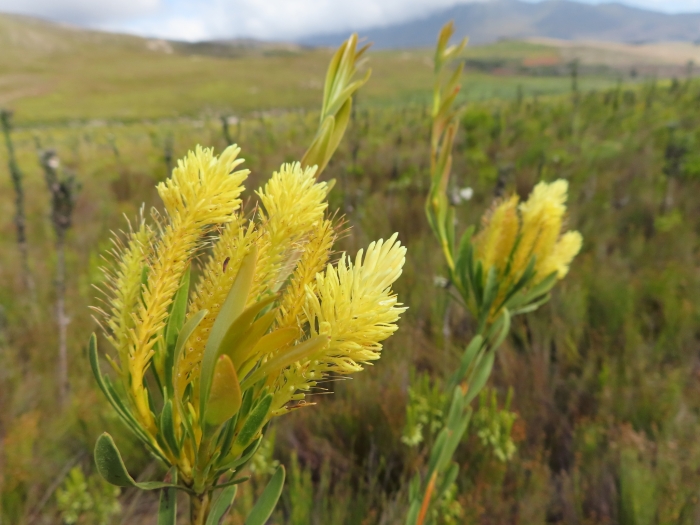Broad-Leaf Featherbush
(Aulax umbellata)
Broad-Leaf Featherbush (Aulax umbellata)
/
/

© linkie
CC BY 4.0
Image By:
© linkie
Recorded By:
Copyright:
CC BY 4.0
Copyright Notice:
Photo by: © linkie | License Type: CC BY 4.0 | License URL: http://creativecommons.org/licenses/by/4.0/ | Uploader: linkie | Publisher: iNaturalist |























































Estimated Native Range
Summary
Aulax umbellata, commonly known as Broad-Leaf Featherbush, is an evergreen shrub native to the fynbos region of Southwestern South Africa, where it thrives in nutrient-poor, well-drained sandy soils. This plant typically grows with a single stem and can reach up to 2.5 meters tall. The term ’umbellata’ refers to the umbrella-like arrangement of its flowers. Broad-Leaf Featherbush blooms from September to February, displaying yellow to orange flowers that are not particularly showy but attract a variety of insect pollinators. After pollination, female flowers dry out and form a woody shell, which protects the seeds. This adaptation is crucial for seed survival, especially since fires are common in its native fynbos habitat and can destroy the adult plants.
Broad-Leaf Featherbush is valued for its unique foliage and architectural form, making it a striking addition to water-wise gardens, rockeries, and coastal landscapes. It is drought-tolerant, requiring low amounts of water once established, and prefers full sun exposure. The plant is well-suited to soils with medium to fast drainage. While it is not commonly affected by diseases, it is adapted to fire-prone environments and relies on fire to release its seeds, which can be a consideration in fire-risk areas. In cultivation outside its native range, care should be taken to prevent it from becoming invasive.CC BY-SA 4.0
Broad-Leaf Featherbush is valued for its unique foliage and architectural form, making it a striking addition to water-wise gardens, rockeries, and coastal landscapes. It is drought-tolerant, requiring low amounts of water once established, and prefers full sun exposure. The plant is well-suited to soils with medium to fast drainage. While it is not commonly affected by diseases, it is adapted to fire-prone environments and relies on fire to release its seeds, which can be a consideration in fire-risk areas. In cultivation outside its native range, care should be taken to prevent it from becoming invasive.CC BY-SA 4.0
Plant Description
- Plant Type: Shrub
- Height: 6-8 feet
- Width: 4-6 feet
- Growth Rate: Moderate
- Flower Color: Yellow
- Flowering Season: Summer
- Leaf Retention: Evergreen
Growth Requirements
- Sun: Full Sun
- Water: Low
- Drainage: Medium, Fast
Common Uses
Bird Garden, Drought Tolerant, Low Maintenance, Showy Flowers
Natural Habitat
Native to the fynbos region of Southwestern South Africa
Other Names
Common Names:
Scientific Names: , Aulax umbellata, Aulax cneorifolia, Protea bracteata, Protea aulacea, Protea umbellata, Protea cneorifolia,
GBIF Accepted Name: Aulax umbellata (Thunb.) R.Br.